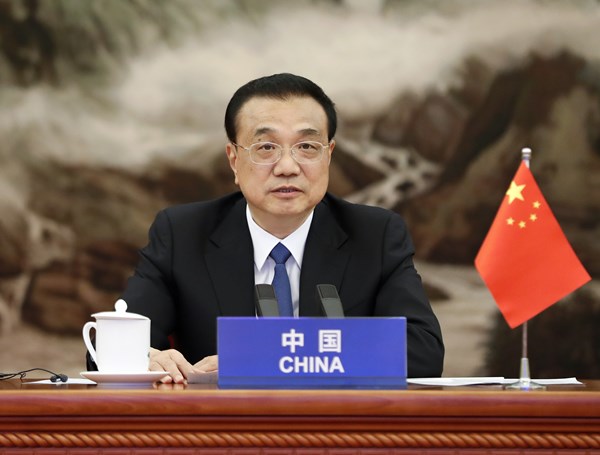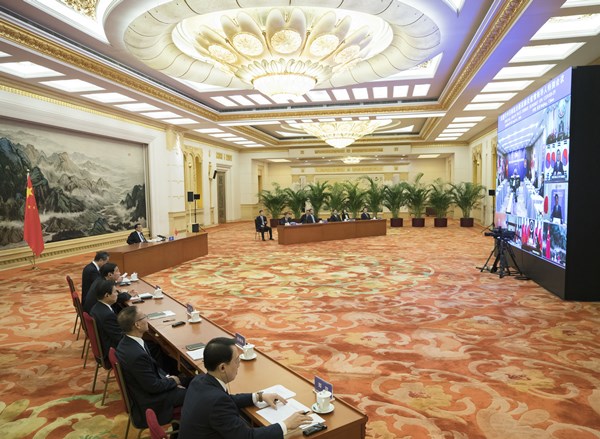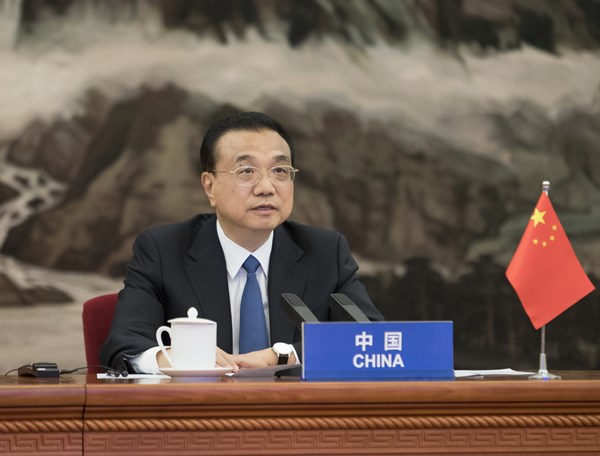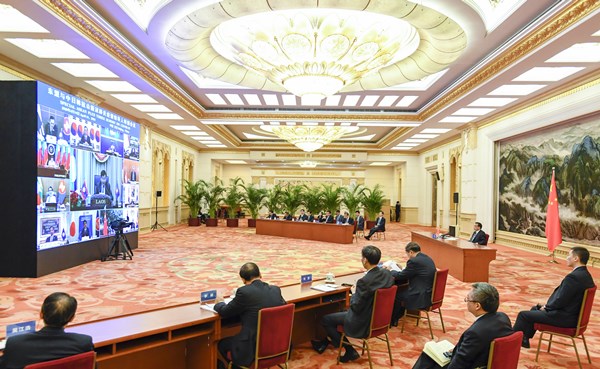Premier Li Keqiang attended a special meeting of the Association of Southeast Asian Nations, China, Japan and the Republic of Korea (also known as 10+3) on COVID-19, via video link on April 14.
Leaders of ASEAN nations, South Korean President Moon Jae-in, Japanese Prime Minister Shinzo Abe, World Health Organization (WHO) Director-General Tedros Adhanom Ghebreyesus, and Secretary General of ASEAN Dato Lim Jock Hoi attended the meeting.

Premier Li said as the virus is spreading in over 200 countries and regions, the life and health of the people around the world and the global economy is under serious threat.
As close neighbors, Premier Li said, ASEAN, China, Japan, and South Korea should act with greater synergy and common purpose, and articulate the determination to work together in closer coordination and cooperation, and make a collective response to the epidemic.
It will send a message of partnership, solidarity and mutual assistance among East Asian countries to boost confidence in the region and beyond, he added.

Premier Li emphasized that the Chinese government has always been people-centered and put people’s life security and health first. "We are proceeding with firm confidence, joint efforts, scientific measures of epidemic prevention and control, and precisely implemented policies," he said.
While making important achievements in the current stage, the resumption of economic and social order is speeding up, said the Premier.
"Next, we will continue our efforts in key areas and major risk points to prevent the resurgence of the epidemic. In front of the epidemic, all countries are bound together and become a community with a shared future. No nation can wall itself off from the consequences of such a global crisis," Premier Li said.

To fight COVID-19 in the region, Premier Li called for efforts to strengthen cooperation on epidemic prevention and control and improve public hygiene.
Departments concerned such as health, customs, transportation and immigration should carry out joint efforts in curbing the outbreak.
He said countries should share their diagnosis and treatment experiences, research data, and information among one another, and cooperate in vaccine development.
According to the Premier, China is willing to offer support and help ASEAN countries within its reach through free assistance and commercial channels. Also, China suggests building a 10+3 reserve center of emergency medical supplies.
China supports WHO’s leading role in fighting COVID-19 and suggests strengthening cooperation and coordination with WHO to jointly safeguard the regional and global public health security.
Premier Li said efforts should be made to restore economic growth in East Asia as quickly as possible and enhance regional economic integration by removing or reducing tariffs, eliminating barriers, boosting trade and investment, and keeping markets open to each other.
For stable industrial and supply chains in the region, a "fast-track lane" should be made available to essential personnel on urgent visits to maintain necessary flows of people and goods, he said.
To push regional economic integration to higher levels, Premier Li called for signing the Regional Comprehensive Economic Partnership (RCEP) agreement this year as planned.
Closely coordinated policy moves will help overcome risks and challenges associated with the epidemic, Premier Li said, stressing confidence in tackling financial risks and challenges facing the financial market, and providing a stabilizing force to the region.
Such coordination involves good emergency preparedness with backing from mechanisms such as the Chiang Mai Initiative Multilateralism, and the ASEAN Plus Three Emergency Rice Reserve aimed at ensuring food supply and market security in the region, the Premier said.
The 10+3 countries support multilateral financial institutions including the World Bank, the Asian Development Bank and the Asian Infrastructure Investment Bank in taking actions to provide market liquidity, he added.
The virus is the common enemy of mankind, the Premier emphasized, and said that the Chinese people, in the face of the epidemic, will stand firm with the people of East Asia and the people of the world through the storm and difficulties.
"I believe that we can definitely overcome the epidemic, revitalize regional economy, and promote a prosperous and stable world," the Premier said.

Other participants at the meeting said that in front of the unprecedented challenges brought about by the epidemic, ASEAN, China, Japan and South Korea are in a community with a shared future, and all parties should uphold the tradition of cooperation, carry forward the experience in responding to crises, and demonstrate solidarity to meet the challenges.
The 10 + 3 countries must coordinate efforts, show leadership, strengthen experience exchanges and information sharing, and conduct cooperation in drug and vaccine research to promote the institutionalization of regional prevention and control, and enhance the capacity to respond to emergency crises in the future.
Closely related in economy, Premier Li said, 10+3 nations should enhance coordination in macro-economic policies, and ensure smooth industrial and supply chains, to resume social and economic order and stabilize market confidence.
Premier Li said the moves will boost economic resilience in the region, adding that efforts should be made for a conclusion of RCEP this year.
After the epidemic, the relations and cooperation between ASEAN and China, Japan, and South Korea will be further expanded, he said.
A joint declaration on the fight against COVID-19 was released after the meeting.
State Councilor Wang Yi and He Lifeng, head of the National Development and Reform Commission, also attended the meeting.